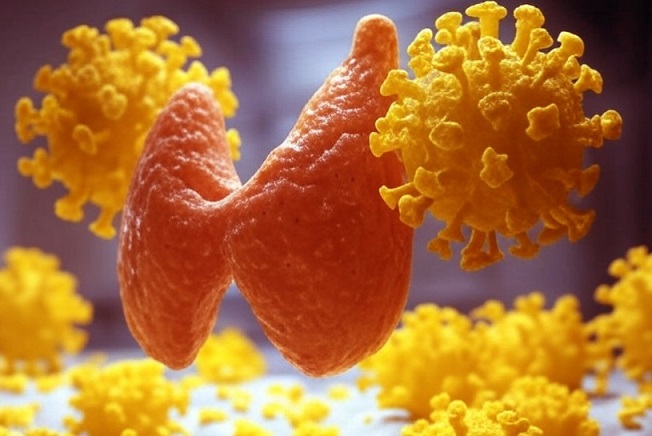French Study Uncovers Impact of COVID-19 on Thyroid Function Tests and the Prevalence of Euthyroid Sick Syndrome
Nikhil Prasad Fact checked by:Thailand Medical News Team Jan 23, 2025 11 months, 1 week, 6 days, 3 hours, 53 minutes ago
Medical News: Since its emergence in late 2019, COVID-19 has presented unprecedented challenges to global health systems. While much of the focus has been on respiratory complications, the virus’s potential to impact other bodily systems, including the thyroid, has been a growing area of research. A new study conducted by researchers from the University Hospital of Nancy in France and the University of Lorraine provides crucial insights into how the first wave of the COVID-19 pandemic influenced thyroid function tests at a population level. This
Medical News report delves into the study’s methodology, findings, and implications for healthcare.
 French Study Uncovers Impact of COVID-19 on Thyroid Function Tests and the Prevalence of Euthyroid Sick Syndrome
Study Overview: Methods and Data Collection
French Study Uncovers Impact of COVID-19 on Thyroid Function Tests and the Prevalence of Euthyroid Sick Syndrome
Study Overview: Methods and Data Collection
The study, led by Gabriel Berkebile, Françoise Barbé, Catherine Malaplate, Lauriane Le Collen, Jean-Louis Guéant, Marc Klein, and Abderrahim Oussalah, involved a repeated cross-sectional analysis. Researchers compared thyroid function test results from March 1 to April 15, 2020, the height of the first COVID-19 wave in northeastern France, with the same period in 2018 and 2019. Data were sourced from the Nancy Biochemical Database, a comprehensive electronic resource covering 67 medical departments. A total of 3968 thyroid function tests were analyzed: 1534 in 2018, 1547 in 2019, and 887 in 2020.
The primary focus was on three thyroid markers: free triiodothyronine (FT3), free thyroxine (FT4), and thyroid-stimulating hormone (TSH). Researchers also investigated the FT3/FT4 ratio and explored correlations between altered thyroid profiles and clinical or biological factors, including COVID-19 infection status.
Key Findings: How COVID-19 Influenced Thyroid Markers
The analysis revealed significant changes in thyroid marker levels during the 2020 period compared to the reference years:
-TSH Levels: The median TSH levels were significantly lower in 2020 (1.2 mIU/L) compared to 2018 and 2019 (1.4 mIU/L).
-FT4 Levels: Median FT4 levels in 2020 were notably higher at 14.6 pmol/L, compared to 11.4 pmol/L in 2018 and 11.1 pmol/L in 2019.
-FT3 Levels: FT3 levels decreased significantly in 2020, with a median of 4.6 pmol/L versus 5.1 pmol/L in 2018 and 5.0 pmol/L in 2019.
The study identified optimal thresholds to distinguish 2020 results from previous years: FT3 ≤4.5 pmol/L and FT4 >12 pmol/L. Subjects in 2020 were 3.62 times more likely to exhibit concurrent low FT3 and high FT4 levels compared to those in 2018 or 2019.
A Closer Look: The Role of Euthyroid Sick Syndrome
One of the study’s critical findings was the prevalence of euthyroid sick syndrome (ESS) among patients with altered thyroid markers. ESS is character
ized by low FT3 and/or FT4 levels without a corresponding rise in TSH. This condition is often observed in severe illnesses and is linked to systemic inflammation. Researchers found that a low FT3/FT4 ratio was independently associated with COVID-19, hypertension, and amiodarone therapy, even after adjusting for confounding factors such as pre-existing thyroid conditions, corticosteroid use, and iodinated contrast exposure.
Population Characteristics and Outcomes
Among the 307 patients with concurrent low FT3 and high FT4 levels, nearly half had a history of hypertension, and over a quarter had diabetes. Amiodarone therapy, corticosteroid use, and iodine exposure were common in this subgroup.
The most frequent primary diagnoses included cardiac issues (25.7%), pulmonary complications (16.0%), and endocrine disorders (13.4%). Alarmingly, 20.3% of these patients died, underscoring the potential severity of their conditions.
Understanding the Mechanisms: How COVID-19 Impacts the Thyroid
The researchers hypothesize that COVID-19 affects thyroid function through multiple mechanisms. The virus’s ability to bind to angiotensin-converting enzyme II (ACE2) receptors - abundant in thyroid tissue - suggests a direct viral attack. Additionally, the cytokine storm characteristic of severe COVID-19 could exacerbate thyroid dysfunction, leading to ESS or subacute thyroiditis. Previous studies have linked elevated inflammatory markers like interleukin-6 (IL-6) to reduced FT3 levels, a finding consistent with this research.
Broader Implications: Managing Thyroid Dysfunction in COVID-19
The study’s findings have significant implications for managing thyroid dysfunction in COVID-19 patients. Given the association between altered thyroid markers and severe disease, thyroid function tests could serve as prognostic indicators. Low FT3 levels, in particular, have been linked to higher mortality rates in COVID-19. This highlights the importance of monitoring thyroid health in hospitalized patients, especially those with severe infections or underlying comorbidities like hypertension.
Conclusions: A Call for Further Research and Clinical Awareness
This study provides compelling evidence of COVID-19’s impact on thyroid function at a population level. It highlights the need for clinicians to remain vigilant about thyroid dysfunction in COVID-19 patients, particularly those with severe disease or predisposing factors like hypertension or amiodarone therapy.
The findings also underscore the importance of integrating thyroid function monitoring into routine care for COVID-19 patients. Such measures could facilitate early detection of complications, allowing for timely interventions and potentially improving outcomes.
Future research should aim to validate these findings through multicenter studies and explore the long-term effects of COVID-19 on thyroid health. Investigating therapeutic strategies, such as administering thyroid hormones to critically ill patients, could also provide valuable insights.
The study findings were published in the peer-reviewed Journal of Infection and Public Health.
https://www.sciencedirect.com/science/article/pii/S1876034125000309
For the latest COVID-19 News, keep on logging to Thailand
Medical News.
Read Also:
https://www.thailandmedical.news/news/polish-medical-researchers-warn-that-covid-19-is-triggering-thyroid-cancers
https://www.thailandmedical.news/news/researchers-warn-that-covid-19-may-contribute-to-the-development-of-thyroid-cancer
https://www.thailandmedical.news/news/viral-infections-including-covid-19-and-thyroid-cancer-a-new-threat-emerges
https://www.thailandmedical.news/news/breaking-news-french-physicians-uncover-malignant-pseudothyroiditis,-a-new-type-of-thyroid-cancer-in-a-post-covid-individual
https://www.thailandmedical.news/news/breaking-news-thai-study-reveals-alarming-rate-of-about-20-2-percent-of-covid-19-patients-found-with-thyroid-incidentalomas
https://www.thailandmedical.news/news/new-insights-into-thyroid-dysfunction-triggered-by-covid-19-s-cytokine-storm
https://www.thailandmedical.news/news/thyroid-function-linked-to-severe-covid-19-outcomes
https://www.thailandmedical.news/news/how-omicron-and-thyroid-dysfunction-impact-covid-19-severity-and-mortality
https://www.thailandmedical.news/news/warning-covid-19-mrna-vaccines-can-cause-subacute-thyroiditis
https://www.thailandmedical.news/news/covid-19-news-doctors-from-west-virginia-warn-that-sars-cov-2-infections-can-lead-to-thyroid-storms
https://www.thailandmedical.news/news/covid-19-news-italian-and-dutch-imaging-study-involving-18f-fdg-pet-ct-reveals-that-sars-cov-2-impairs-thyroid-and-adrenal-glands-functions
https://www.thailandmedical.news/news/covid-19-news-italian-researchers-warn-that-sars-cov-2-can-cause-autoimmune-thyroid-diseases-aitd
https://www.thailandmedical.news/news/covid-19-causes-endocrine-issues-such-as-suppressed-function-of-the-thyroid-gland,-suppressed-male-sex-hormone-secretion-and-elevated-prolactin
(Please refer to TMN site as there are more than 147 articles on studies, case reports etc on the kinds of damage on the thyroid gland that COVID-19 is causing. Many doctors are unaware of these and are not conducting relevant health screenings of their patients!)
